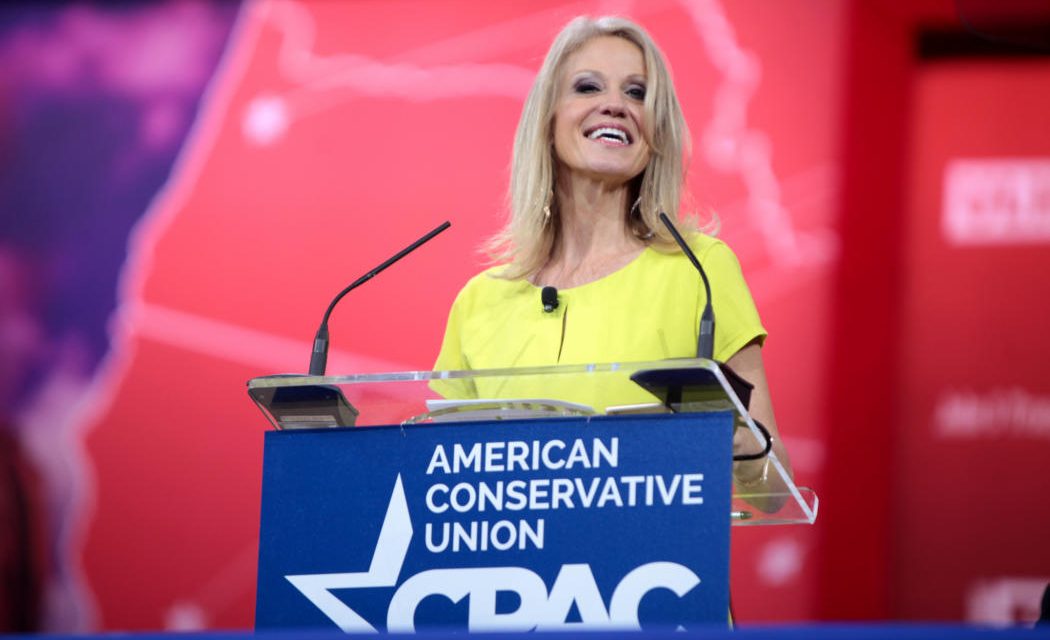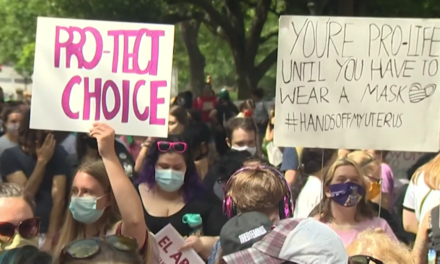Image Credits: Gage Skidmore/Flickr.
Back in 2014, the Republicans had accused enough members of the Obama administration of violating the Hatch Act that the Washington Post decided to publish an “explainer.”
The Hatch Act, also known as An Act to Prevent Pernicious Political Activities, is designed to prevent members of the federal government who do not have explicitly political roles — like the president or vice-president — from engaging in political activity.
That means that if you are Secretary of Transportation, for example, you can’t hold a fundraiser for the incumbent House member in your hometown. If you are a mailman, you can’t run for the state Senate. You can’t wear a “Steven Colbert for President of South Carolina” button while working at the National Archives.
The law was reluctantly signed by Franklin Roosevelt back in 1939. It was really a reflection of some growing divisions within the Democratic Party. At the time, FDR was battling some of the more conservative Democrats in Congress. It was also damage control from a scandal that had arisen during the 1938 elections.
Widespread allegations that local Democratic Party politicians used employees of the Works Progress Administration (WPA) during the congressional elections of 1938 provided the immediate impetus for the passage of the Hatch Act. Criticism centered on swing states such as Kentucky, Tennessee, Pennsylvania, and Maryland. In Pennsylvania, Republicans and dissident Democrats publicized evidence that Democratic politicians were consulted on the appointment of WPA administrators and case workers and that they used WPA jobs to gain unfair political advantage.
You can consider it an anti-cronyism bill, but it was difficult to craft something that would crack down on people using their offices for political advantage without unduly curtailing citizens’ free speech rights. The Democrats never seemed to like the bill. In the 1970’s, they tried and failed to exempt postal workers and the liberals on the Supreme Court dissented from a case that upheld the law. House Democrats passed a law to allow federal employees to run for office, but the Senate took no action.
In practice, it seems to be enforced against civil servants but rarely against high-ranking members of the cabinet or administration. Enforcement is the responsibility of the U.S. Office of Special Counsel, which is a permanent and distinct office from Robert Mueller’s operation. The Office has just taken the highly unusual step of making a referral to President Trump recommending that his adviser Kellyanne Conway be terminated for being a “repeat offender” of the Pernicious Political Activities Act.
“Ms. Conway’s violations, if left unpunished, would send a message to all federal employees that they need not abide by the Hatch Act’s restrictions. Her actions thus erode the principal foundation of our democratic system—the rule of law.”
“If Ms. Conway were any other federal employee, her multiple violations of the law would almost certainly result in her removal from her federal position…Never has (the office) had to issue multiple reports to the President concerning Hatch Act violations by the same individual.”
Conway was aware that her conduct was under scrutiny, but she was completely dismissive of the law.
“Blah, blah, blah,” she said May 29th when she was asked about the Hatch Act by reporters at the White House. “If you’re trying to silence me through the Hatch Act, it’s not going to work. Let me know when the jail sentence starts.”
The White House has already responded to the referral by accusing the U.S. Office of Special Counsel of being a bunch of agenda-driven liberals.
“The Office of Special Counsel’s unprecedented actions against Kellyanne Conway are deeply flawed and violate her constitutional rights to free speech and due process,” spokesman Steve Groves said. “Others, of all political views, have objected to the OSC’s unclear and unevenly applied rules which have a chilling effect on free speech for all federal employees. Its decisions seem to be influenced by media pressure and liberal organizations – and perhaps OSC should be mindful of its own mandate to act in a fair, impartial, non-political manner, and not misinterpret or weaponize the Hatch Act.”
It’s relatively easy to run afoul of the Hatch Act, especially for a political adviser like Conway. It usually results in a mild rebuke and an instruction to knock off the political commentary. What’s different in this case is that Conway has refused to modify her behavior. For example, she was chastised in March 2018 for weighing in on the primary candidates in the Alabama special election to replace Jeff Sessions in the Senate. Yet, she went on to comment on numerous Democratic candidates for president.
At issue are Ms. Conway’s media appearances attacking Democrats running for their party’s nomination to challenge Mr. Trump next year. The Office of Special Counsel concluded that she “violated the Hatch Act on numerous occasions by disparaging Democratic presidential candidates while speaking in her official capacity during television interviews and on social media.”
Among other instances, the report highlighted Ms. Conway’s comments on Fox News attacking candidates like former Vice President Joseph R. Biden Jr., Senators Bernie Sanders of Vermont, Elizabeth Warren of Massachusetts, Cory Booker of New Jersey and Amy Klobuchar of Minnesota and former Representative Beto O’Rourke of Texas.
The U.S. Office of Special Counsel took particular offense to her dismissive “Blah. Blah. Blah,” comment back at the end of May, and they let the White House know about their displeasure.
The recommendation that Conway be dismissed carries no force of law and will of course be ignored, but almost all government employees must abide by these standards or risk unemployment. It would be one thing if the White House said that they understood the message and would rein Conway in in the future, but their position is that she doesn’t need to change her behavior at all.
If that’s their position, they should move to amend the Hatch Act. As long as the law is on the books and is applied to other people, Kellyanne Conway shouldn’t be exempt from its requirements.





